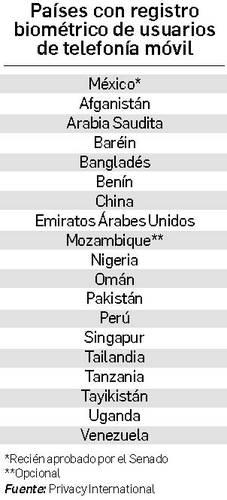La Jornada - Mexico will join countries that require biometric registration
With the approval of the National Register of Mobile Telephony Users by the Congress of the Union, Mexico joins 17 countries that require the registration of biometric data associated with SIM cards through their laws. They include Afghanistan, Saudi Arabia, Bahrain, Bangladesh, Benin, China, Nigeria, Oman, Pakistan, Peru, Singapore, Tajikistan, Tanzania, Thailand, Uganda, the United Arab Emirates, and Venezuela.
The registry approved by the Senate will include information such as nationality, Unique Population Registry Code, some biometric element (fingerprint, facial or retina recognition), address, company that provides the service and contracting scheme, as approved on Tuesday.
According to information retrieved by Privacy International, a non-governmental organization, and Comparitech, a consumer-oriented platform, the measures taken in various countries to associate biometric data with a cell phone range from requiring fingerprints to face recognition.
It depends on each country, but the sanctions for not registering biometric data when acquiring a SIM card (subscriber identity module), or even falsifying the information, range from fines to mobile operators, to the suspension of the lines and even jail for a year or two for the users.
In China, facial recognition is required, the same as in Singapore with the company SingTel; while in Nigeria and Thailand both facial recognition and fingerprints are mandatory. Fingerprints are required in Tanzania, Saudi Arabia, Uganda, Pakistan, Bahrain, Bangladesh, Tajikistan, the United Arab Emirates, Oman, Afghanistan, Benin, Peru and Venezuela.

Apart from these 17 countries joined by Mexico, in Mozambique it is optional to ask for fingerprints instead of official identification, when purchasing a mobile line.
I should feel shamed that I don't know how to pair my laptop to my printer I've had this guy a little over month no… https://t.co/hpnx4VKKcn
— jevon hudson Thu Jan 16 20:56:03 +0000 2020
According to a study carried out in January 2020 by the GSM Association –which brings together mobile operators and companies associated with telecommunications–, in 155 countries it was mandatory to register personal data when acquiring a SIM, whether it was name, national identification number or address; and at that time eight percent of nations required mobile operators to collect biometric data.
The association reported that in most countries some personal data is requested with the registration of a line, but in 34 more it is not; among them Mexico, Nicaragua, the United States, Canada, the Netherlands, Portugal, Slovenia, Switzerland, the United Kingdom, Moldova, Lithuania, Liechtenstein, Latvia, Ireland, Iceland, Finland, Estonia, Denmark, the Czech Republic, Croatia, Bosnia and Herzegovina, Vanuatu , Solomon Islands, Samoa, New Zealand, Nauru, Micronesia, Marshall Islands, Kiribati, Israel, Hong Kong, Georgia, Comoros and Cape Verde.
According to Comparitech, the “worst policies” for SIM registration are those that ask for biometric data; Given that they are not usually accompanied by a regulation of personal data, there are no clear definitions of the period in which the State can safeguard this information and because the authorities can intervene in a massive way the telephone lines and access personal information without a court order.
Despite mounting evidence that mandatory SIM registration is costly, intrusive and not the solution to the problem most countries are trying to solve, every year more governments try to implement it, warns Privacy International .
With the approval of the National Register of Mobile Telephone Users, in less than a month two surveillance measures have been imposed on all those who have a cell phone. Since March 23, digital banking customers must allow access to their location when carrying out operations, since "banks are obliged to obtain and keep the geolocation in real time of the device" to prevent money laundering, reported the Association of Banks of Mexico.
